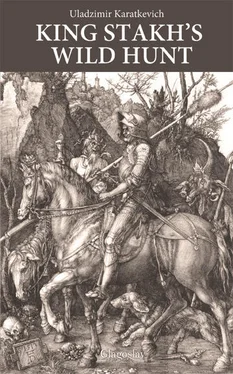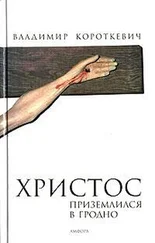Uładzimir Karatkievič
King Stach's Wild Hunt
I am an old man, a very old man. And no book can give you any idea of what I, Andrej Biełarecki, now a man of 96, have seen with my own eyes. People say that fate usually grants long life to fools so that they should have time enough in which to acquire rich experience, experience that will make up to them for a lack of wisdom. Well then, I wish I were twice as foolish and might live twice as long, for I am an inquisitive fellow. How much that is interesting will occur in this world in the coming 96 years!
And if someone should tell me that tomorrow I shall die, so what of it? To rest is not a bad thing either. Some day people will be able to live much longer than I have lived, and they will not have known any bitterness in their lives: in mine I have experienced everything — and life has not always been a bed of roses — what then is there to regret? I can lie down and go to sleep, to sleep calmly and even with a smile.
I am alone. As Shelley puts it:
When the lute is broken,
Sweet tones are remember'd not:
When the lips have spoken,
Loved accents are soon forgot.
She was a good person, and we lived together, as the old tales tell us: “Long and happily till death did us part.” However, enough! I have overtaxed your heart with sorrowful words, — I have already said that my old age is a happy one — better to tell you of those remote days of my youth. Here it is demanded of me that my story bring to an end my reminiscences of the Janoŭski family and its decline, and the extinction of the Belarusian gentry. I'll have to do that, for really what kind of a history can it be without an ending?
Besides, it closely concerns me and there is no one but myself who can tell it. And you will find it interesting to listen to this amazing story to the very end, and then to say that it greatly resembles fiction.
So then before beginning, I must say that all this is the truth and nothing but the truth, although you will have only my word for it.
I was travelling in a hired carriage from the provincial city M. to the most remote corner of the province, and my expedition was coming to an end. Some two more weeks remained of sleeping in haylofts or under the stars in the carriage itself, of drinking water from earthenware pots, water that made the teeth and forehead ache, of listening to the long, drawn-out singing of the old women sitting in the yards in front of their houses, singing of the woe of the Belarusians. And of woe there was plenty in those days: the cursed eighties were coming to an end.
However, you must not think that the only thing we did at that time was to wail and ask of the mužyk [1] Mužyk — peasant, man, fellow.
: “Where are you running to, mužyk?” or “Will you awaken in the morning strong and hearty?” The real compassion for the people — that came later. It is well-known that a man is very honest until the age of twenty-five. He cannot, organically cannot bear injustice when young: however, young people are too much taken up with themselves. Everything is new to them. They find it interesting to watch the development of new feelings awakening in their souls, and they are certain that no one has ever previously experienced anything equal to their emotions.
It is only later that the sleepless nights will come, when bending over a scrap of newspaper, you will read a notice in the same print as all the other news, that three were taken to the scaffold today — three, you understand, alive and merry fellows! It is only then that the desire will come to sacrifice yourself.
At that time, though, I was convinced in the depths of my soul (although I was considered a “Red”), that the forests which grow on earth are not only forests of scaffolds (which was, of course, true even during the times of Jazafat Kuncevič and the Belarusian “slander” inquisition), and that it was not only moaning which we heard in the singing. For me at that time it was much more important to understand who I was and which gods I should pray to. My surname, people said, was a Polish one, though even now I do not know what is Polish in it. In our high-school — and this was at the time when the dreadful memory of the trustee, Kornilov, Muravyov's associate, had not yet been forgotten, — our nationality was determined, depending on the language of our forefathers, “the eldest branch of the Russian tribe, pure-blooded, truly Russian people!” That's right, even more Russian than the Russians themselves!
Had they preached this theory to us before the beginning of the century, then Belarus would inevitably have broken down Germany's borders, while the Belarusians would have become the greatest oppressors on earth, going on to conquer the vital lands of the Russians who were not really Russians, especially if the good gods had given us of the horn of plenty.
I sought my people and began to understand, as did many others at that time, that my people was here, at my side, but that for two centuries the ability to comprehend that fact had been beaten out of the minds of our intelligentsia. That is why I chose an unusual profession for myself — I was going to study and to comprehend this people.
I graduated from high-school and the university and became an ethnographer. This kind of work was only in its beginning at that time and among the powers that be it was considered dangerous for the existing order.
But everywhere — and only this made my work easier for me — I met with aid and attention. Many people helped me: the clerk of our small district, a man of little education, who later on mailed me and Romanov notes on tales; the village teacher, shivering for his piece of bread; and (my people lived!) even the governor, an exceptionally kind man, a rarity, gave me a letter of recommendation in which he ordered under threat of severe punishment that I should be given the aid I needed.
My thanks to you, my Belarusian people! Even now I offer prayers for you. What then can be said about those years?
Gradually I began to understand who I was.
What was it that made me understand?
Perhaps it was the warm lights of the villages, and their names, which even to this very day fill my heart with warmth and a kind of pain: Linden-Land, Forty Tatars, Broken Horn, Oakland, Squirrels, Clouds, Birch-Land Freedom.
Or perhaps it was warm nights when tales are told and drowsiness is stealing up on you under the sheepskin coat together with the cold? Or the intoxicating fragrance of the fresh hay and the stars shining through the holes in the roof of the hayloft? Or not even this, perhaps? But simply the pine needles in the teapot, the smoky, black huts where the women in their warm, long skirts made of homespun material, sing their song, an endless song more like a groan?
All this was mine, my own. Over a period of two years I had travelled — on foot or in a carriage — across the Miensk, Mahiloŭ, Viciebsk provinces and part of the Vilnia province. And everywhere I saw blind beggars and dirty children, saw the woe of my people whom I loved more than anything else in the world — this I know now.
This region was an ethnographic paradise then, although the tale, especially the legend, as the most unstable products of a people's fantasy, began to retreat farther and farther into the backwoods, into the most remote, forsaken corners.
There, too, I went. My legs were young, and young was my thirst for knowledge. And the things that I saw!
I saw the ceremony, an extraordinarily important one, called in Belarusian “załom”, that is, if an enemy wished to bewitch somebody's field, he tied together a bunch of wheatears into a knot.
I saw the stinging nettle yuletide, the game “pangolin” (lizard), a rare one even for those days. But more often I would see the last potato in the soup-plate, bread as black as earth, the enormous eyes of the women crying their eyes out, and I would hear the sleepy “a-a-a” over the cradle.
Читать дальше



